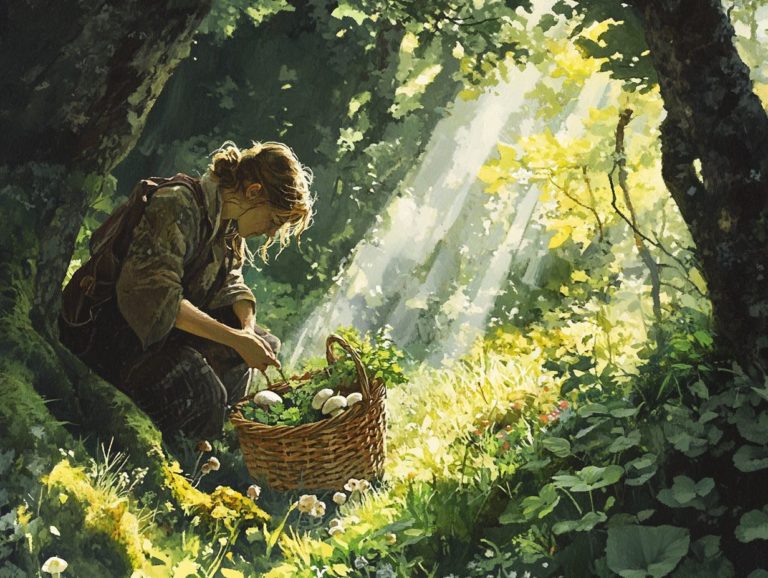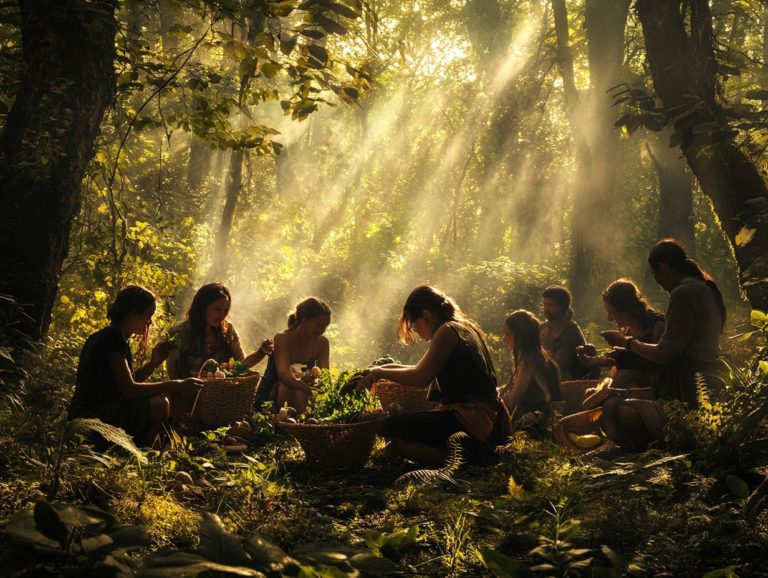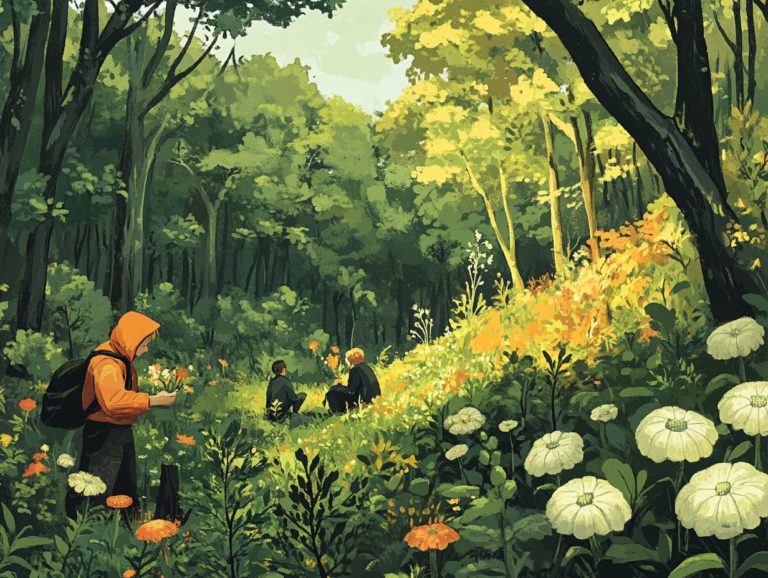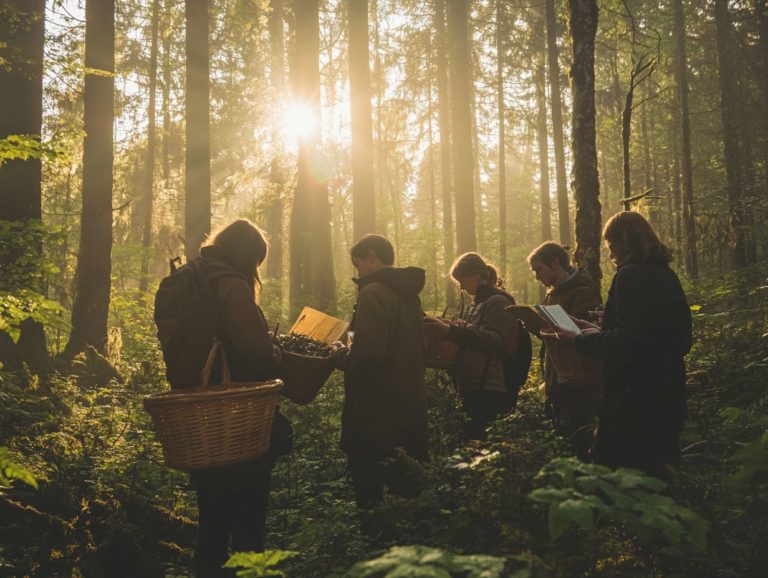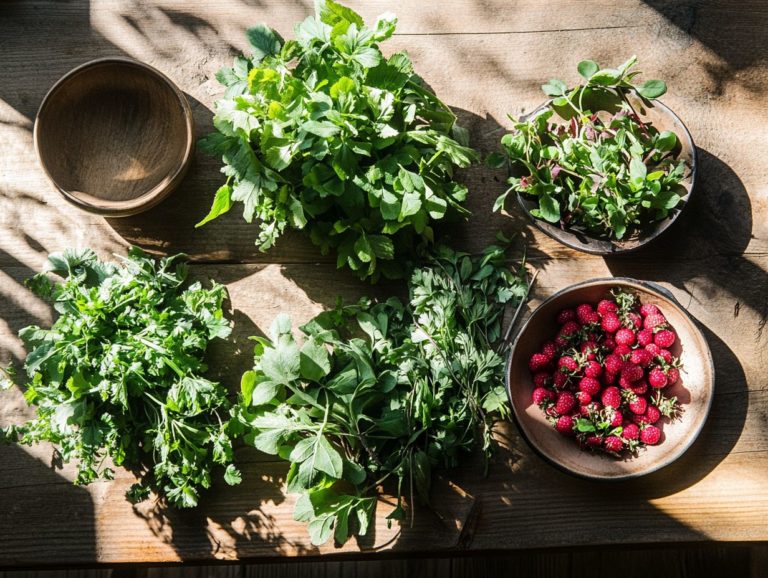What are the Legalities of Foraging?
Foraging goes beyond just being trendy; it invites you on an exhilarating journey into the wild, unveiling a treasure trove of delicious and nutritious foods lying right beneath your feet.
Before embarking on this adventure, grasping the legal landscape is paramount. This guide will help you discover essential legal considerations surrounding foraging, delve into its many benefits, highlight common edible plants and fungi, and address the ethics of sustainable harvesting.
With practical tips designed for your success, you ll be thoroughly prepared to forage both responsibly and joyfully. Immerse yourself in the wonders of wild food and discover what nature has to offer!
Contents
Key Takeaways:
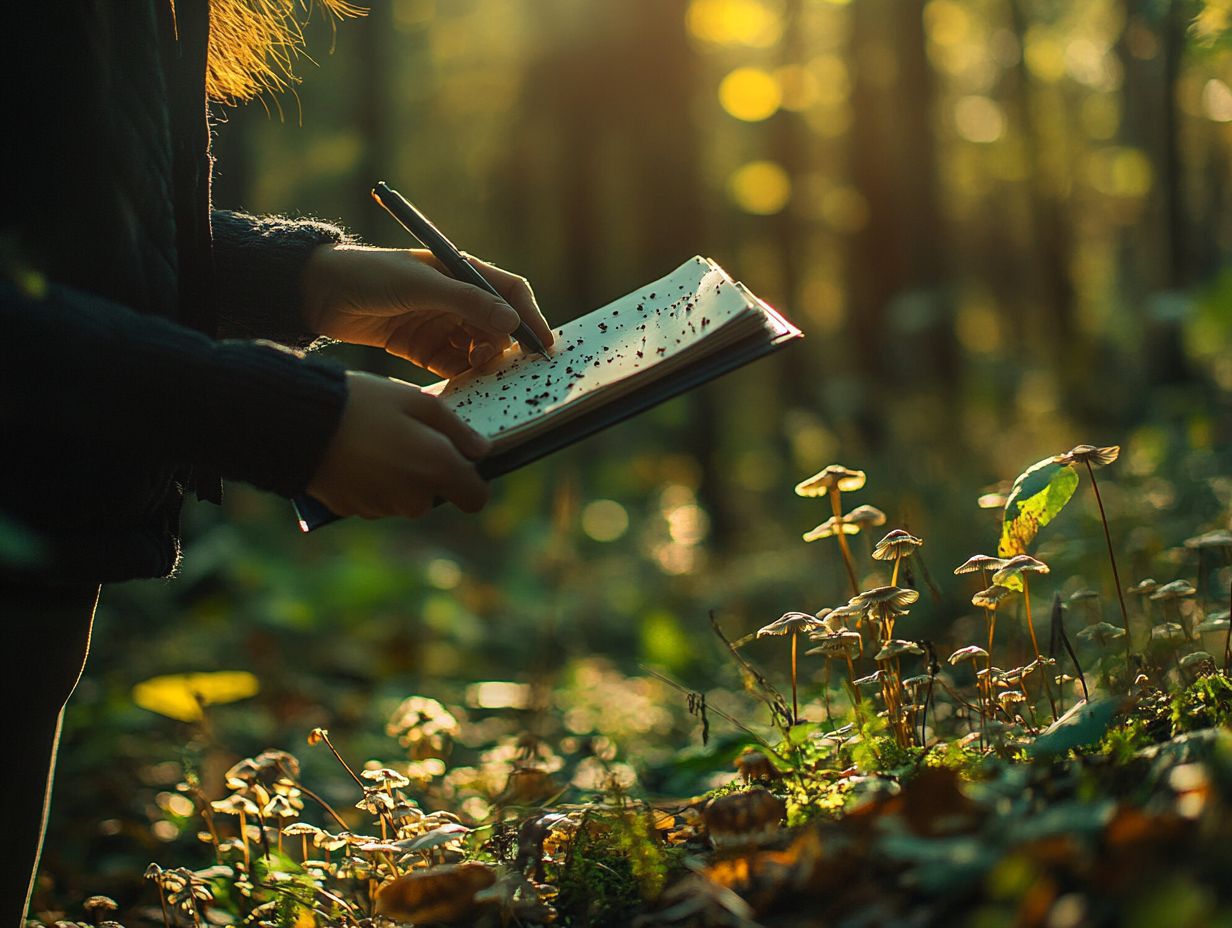
- Foraging involves searching and collecting wild foods, but understanding local laws and regulations is crucial to avoid legal trouble.
- Foraging offers nutrition and helps the environment by reducing carbon footprint.
- Practicing ethical foraging by harvesting sustainably and respecting nature ensures the longevity and preservation of wild foods for future generations.
What is Foraging?
Foraging is your ticket to exploring the wild bounty of nature, where you can search for and gather a diverse array of foods, from delectable plants to intriguing mushrooms. This time-honored practice not only deepens your connection with the natural world but also enhances your understanding of food culture and ecological balance.
It opens the door to insights about the nutritional and historical significance of wild edibles, allowing you to grasp sustainable practices and the pressing issues of biodiversity loss the decrease in the variety of living things and food availability.
As you engage in foraging, you become a steward of your local landscape, recognizing the critical importance of biodiversity and the need to conserve natural habitats. Searching for wild foods helps you appreciate seasonal changes and local flavors, preserving the rich tapestry of food history and heritage.
Foraging supports community rights and ethical practices, instilling a sense of shared responsibility and ownership over local resources. This deep connection to the land not only enriches your diet but also reinforces community resilience, ensuring that traditional knowledge and sustainable methods are lovingly passed down through generations.
Legal Considerations for Foraging
Understanding the legal considerations for foraging is essential, whether you’re a novice or a seasoned forager. Laws can differ significantly based on public lands, national parks, and local jurisdictions.
These regulations protect natural resources and promote sustainable practices, making it vital for you to be well-informed about foraging laws to steer clear of any potential penalties.
You should also take into account historical laws and environmental impacts, fostering respect for community rights and indigenous lands while championing taking care of the environment.
Understanding Local Laws and Regulations
Understanding local laws and regulations surrounding foraging is crucial if you re keen on responsibly gathering wild foods and medicinal herbs. Each state or region has its own specific rules that dictate what you can harvest, where you can do it, and the ethical standards you should follow.
Familiarizing yourself with these legal frameworks will help you practice sustainably, protect community rights, and maintain the integrity of public spaces.
For instance, certain areas may forbid the collection of plants in protected environments like national parks or wildlife reserves. Guidelines often specify harvesting limits or seasonal restrictions to prevent over-exploitation.
To uncover relevant legal information, you can explore local government websites, conservation organizations, or attend community workshops. By understanding these laws, you not only learn to forage responsibly but also appreciate the importance of preserving local ecosystems for future generations while respecting the rights of your neighbors.
Stay informed to enjoy this rewarding activity without worry!
Benefits of Foraging
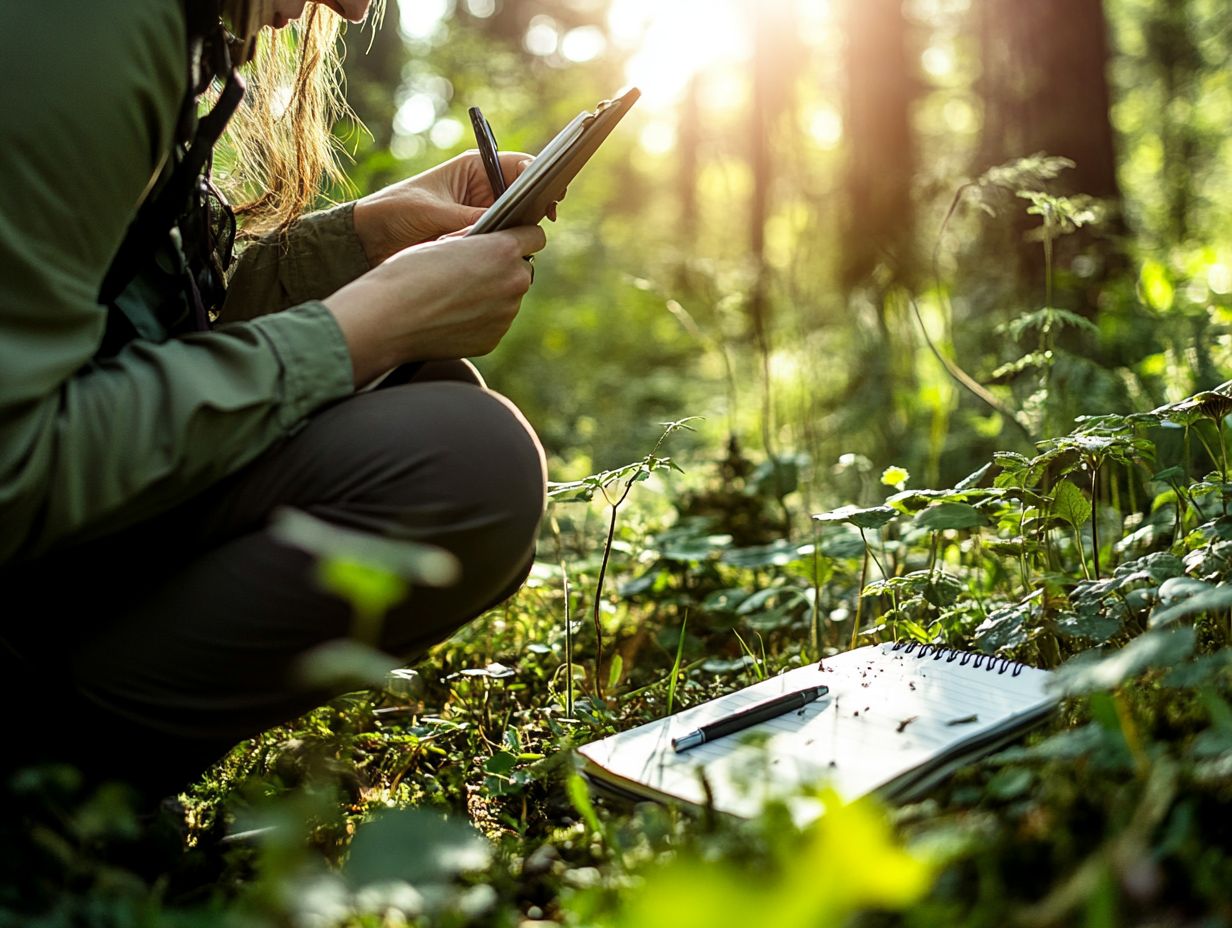
Foraging offers a wealth of benefits for both nutrition and the environment. It enhances food security and promotes sustainable practices within communities.
Gathering wild foods and medicinal herbs elevates your diet and supports biodiversity, strengthening local ecosystems.
This practice fosters community support and food sovereignty. It allows you to reconnect with your local environment and appreciate the abundance of wild edibles nature provides.
Nutritional and Environmental Benefits
The nutritional and environmental perks of foraging are remarkable. Wild foods often contain higher levels of vitamins and minerals than cultivated ones. By gathering these edibles, you contribute to food security while combating biodiversity loss.
As a forager, you’ll uncover a treasure trove of nutrient-dense options. Enjoy dandelion greens rich in calcium and antioxidants, or savor wild berries bursting with vitamins C and E. Unlike many store-bought foods, often produced in monocultures, foraged items nourish both your body and the earth.
Choosing to forage not only enhances your health but also supports a diverse ecosystem. It creates a meaningful connection to your local landscape and has a positive impact on both your well-being and the planet.
Common Edible Plants and Fungi
Common edible plants and fungi offer an impressive variety of species from diverse environments, each with unique flavors and nutritional benefits. From dandelions and nettles to wild mushrooms, every wild edible has distinct identification traits crucial for safe harvesting.
Familiarizing yourself with these plants enhances your dietary choices and encourages responsible harvesting that honors local ecosystems.
Identifying and Safely Harvesting Wild Foods
Identifying and safely harvesting wild foods is vital for foragers. Improper identification can lead to health issues. By learning key plant identification characteristics and best practices for mushroom foraging, you enrich your experience while ensuring the sustainability of native plants.
Understanding local ecosystems is essential. Observe seasonal changes and recognize growth patterns to make safer choices in your foraging. Always carry a reliable field guide, and seek advice from seasoned foragers or join workshops to boost your knowledge.
Ethical foraging emphasizes leaving enough plants behind for propagation, maintaining ecological balance. Engaging in discussions about local flora sharpens your skills and raises community awareness about preserving natural habitats, fostering harmony between humans and the environment.
Foraging Ethics
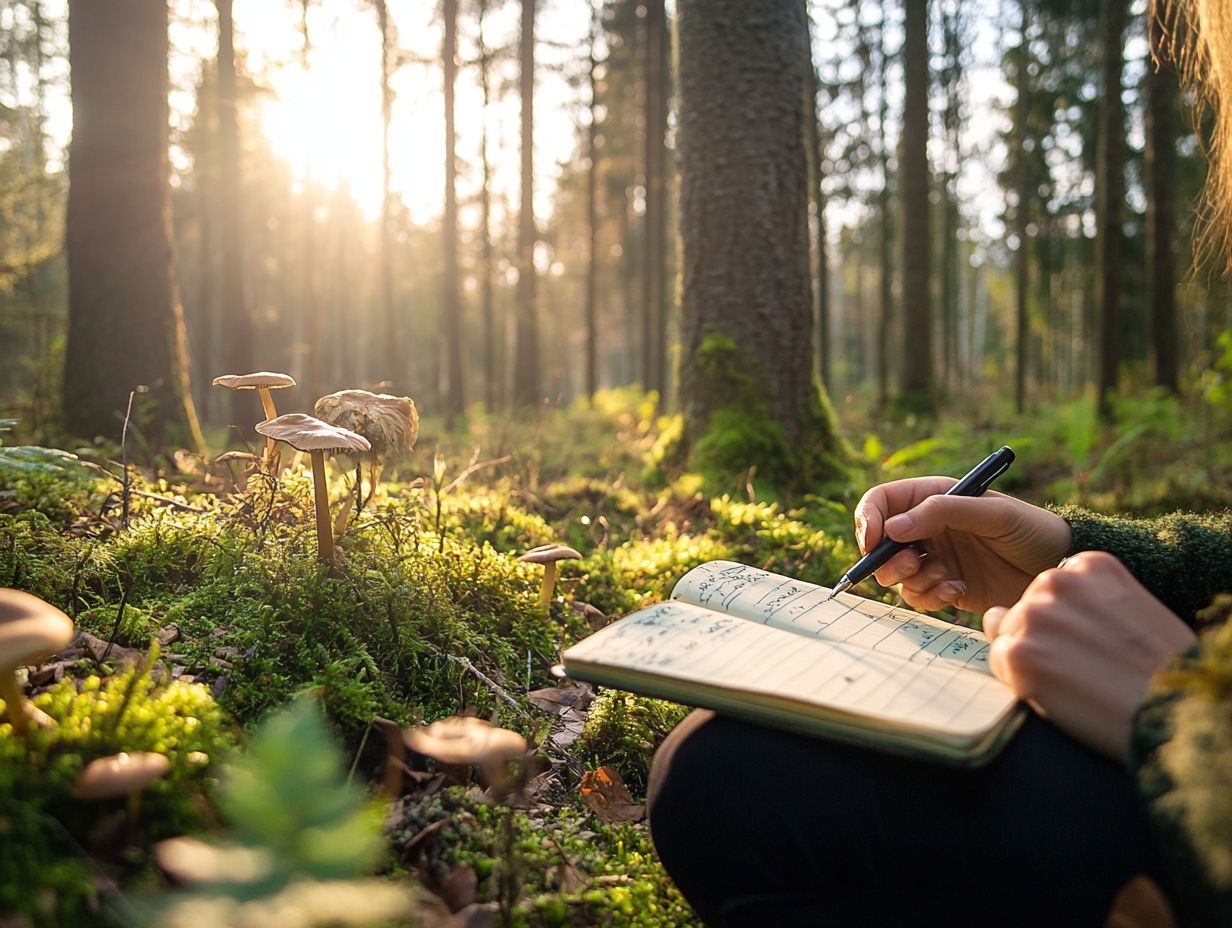
Foraging ethics encompass principles that guide your interactions with the environment. These ethics emphasize sustainable practices and respect for local ecosystems.
When engaging in ethical foraging, consider the environmental impact of harvesting plants and mushrooms. Advocate for mindfulness and responsibility toward indigenous rights and community support.
By prioritizing these ethical standards, you contribute positively to nature and society, enriching your experience and that of those around you.
Practicing Sustainable Foraging and Respect for Nature
Practicing sustainable foraging means making thoughtful choices that honor nature and champion ecological stewardship within your local environment. By adhering to guidelines for foraging and being mindful of the environmental impact of your actions, you can help ensure the longevity of wild foods and the overall health of ecosystems. This mindful approach ignites your connection with nature and inspires others to join the journey!
Sustainable foraging is more than just gathering food; it represents a broader commitment to maintaining biodiversity and protecting habitats while addressing conservation issues. Prioritize collecting only abundant wild edibles and avoid harvesting rare or endangered species, including medicinal herbs. Use techniques that allow plants to regrow and take care not to damage the surrounding ecosystem these practices are essential.
Staying aware of seasonal cycles is crucial for understanding when specific plants are at their peak, ensuring that your foraging aligns with natural growth patterns. Respecting local communities and their cultural practices for nature and its resources cultivates healthier ecosystems and food security and fosters a community ethos centered around ecological responsibility and environmental stewardship.
Tips for Foraging Success
Foraging success depends on a blend of preparation and understanding of local environmental laws, knowledge, and the right techniques. It is crucial for you to seek expert advice and practical foraging tips.
As an urban forager, you stand to gain immensely from specialized guidance and community support that can help you navigate your local environment with confidence. Enrolling in a wildcrafting course and ethical foraging practices can elevate your skills, enabling you to fully embrace and maximize your wild food experience.
Expert Advice and Techniques
Expert advice and techniques are essential for anyone aiming to elevate their foraging skills and ensure a rewarding experience in gathering wild foods and mushroom foraging.
By refining your abilities in plant identification characteristics and techniques and understanding the seasonal availability of various species, you can markedly improve your chances of safely collecting nutritious edibles, which include various wild foods. Knowledge of sustainable harvesting methods is crucial not just for your personal benefit but also for safeguarding local ecosystems.
Learning from seasoned foragers, who often share invaluable stories and hidden gems about their favorite spots and foraging tips, can tremendously boost your confidence in the field.
Engaging in wildcrafting courses that teach sustainable practices deepens your understanding and cultivates a sense of community, allowing you to explore nature with both respect and curiosity about food history and ecological balance.
Frequently Asked Questions
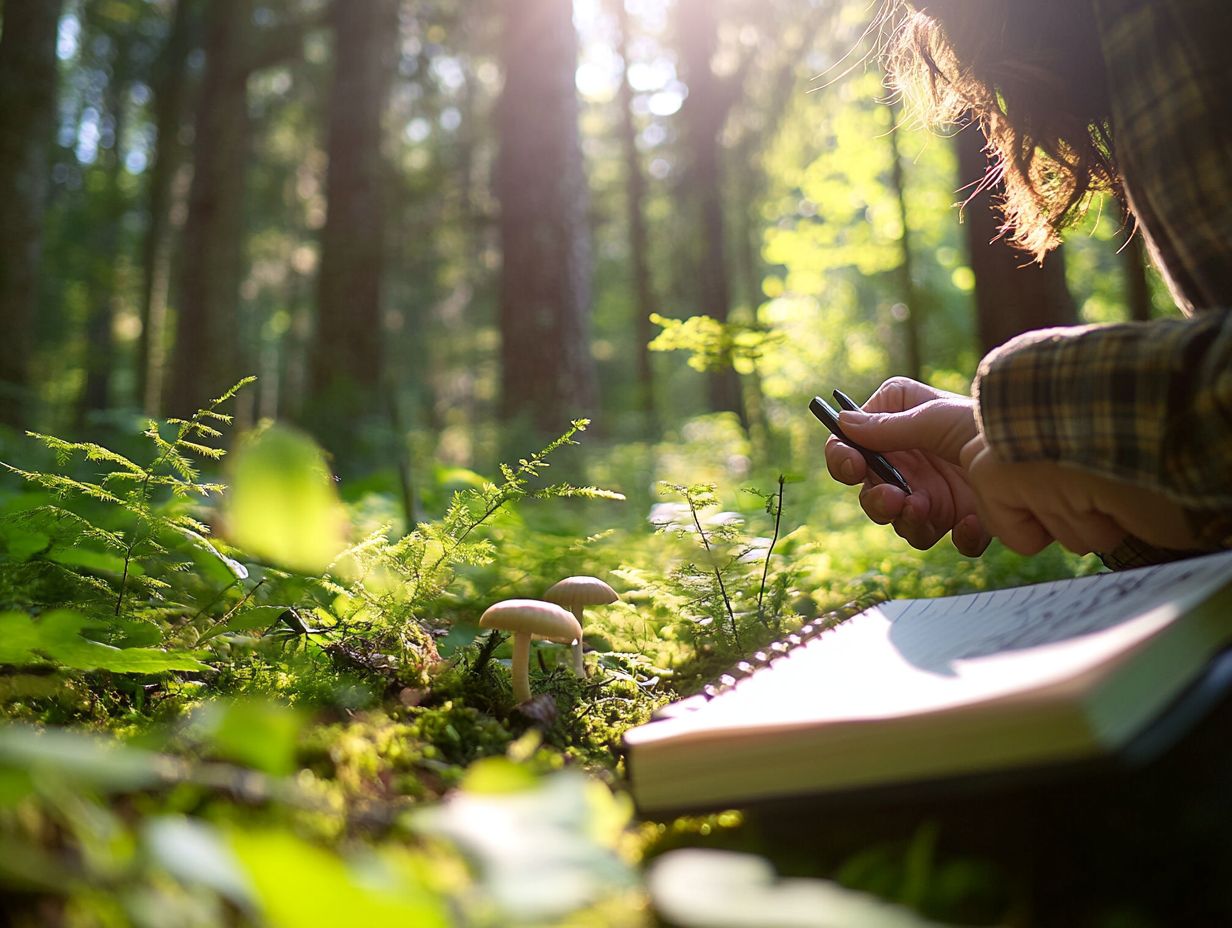
What are the Legalities of Foraging?
Foraging is the act of gathering wild plants, mushrooms, and other natural materials for food or medicinal purposes. However, before engaging in foraging, it is important to understand the legalities surrounding this activity, including foraging laws regarding ecological impact and community support, including historical laws on ancestral lands, particularly in urban foragers’ areas like Baltimore and DC that vary in public lands and national parks.
Is foraging legal in all areas?
No, foraging laws vary by location. It is important to research and understand the laws in your specific area before foraging.
What happens if you forage without permission?
Foraging without permission can lead to fines, criminal charges, and even jail time in some cases. It is important to obtain proper permission and follow all laws and regulations when foraging.
Are there any restrictions on what can be foraged?
Yes, there may be restrictions on certain plants, mushrooms, or other materials that can be foraged. These restrictions may be in place to protect endangered species or preserve natural habitats.
Do I need a permit to forage?
Some areas require a permit for foraging, while others do not. Always check with local authorities to find out if you need one.
What should I know about foraging regulations and community rights?
Foraging regulations often limit how much you can harvest and where you can forage. Understanding these rules is crucial to avoid legal issues and enjoy your foraging adventures responsibly.

